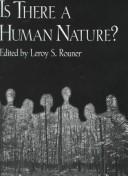
Is there a human nature?
By Leroy S. Rouner
Subjects: Philosophical anthropology, Philosophische Anthropologie, Anthropologie philosophique, Kongress
Description: These essays approach the question in two different ways. The first is a philosophical attempt at definition. Bhikhu Parekh agrees that there is a universal human nature but that there is also a nature which is culture-specific and a third which is self-reflective. Daniel Dahlstrom argues that we know our nature only when it is recognized by our culture and that the liberal democratic idea of the state both celebrates and threatens the notion of fundamental human equality. Stanley Rosen gives a contemporary interpretation of the classical Greek view in proposing that philosophy is an expression of our humanity, an openness to the human love of wisdom. Knud Haakonssen is not ready to endorse any given orthodoxy regarding human nature but argues rather for openness to experimental views and promising hypotheses. Lisa Sowle Cahill defends a feminist interpretation of Catholic moral theology; we must be able to say that the battering of women is everywhere and always wrong. And Robert Cummings Neville notes that being human means having the obligation to take responsibility for our history. The second group of essays recognizes that we are what we do as well as what we say we are and asks what it means to be genuinely humane. Glenn Loury criticizes Murray and Herrnstein's The Bell Curve as advocacy for a particular elitist view of human nature, which he rejects. Ray Hart explores the moral "fault" and "fallenness" in human nature. Graham Parkes insists that human nature is not morally privileged but must be seen as part of nature taken as a whole. Tu Wei-ming explores the Confucian idea of filial piety as a key to global ethics. Leroy Rouner examines Kierkegaard's psychology of sin, and Sissela Bok uses the metaphor of the lifeboat to see what extreme situations reveal about our nature as human beings.
Comments
You must log in to leave comments.